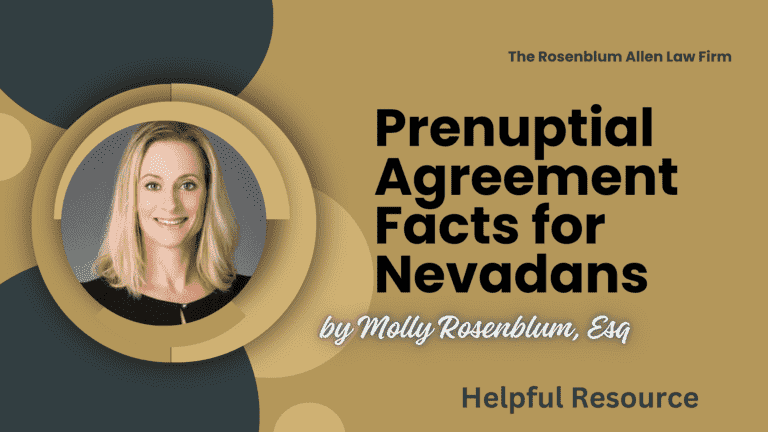
A prenuptial agreement, often called a “prenup,” is like a safety net for your future. It’s a legal document designed for couples who are planning to marry.
You wouldn’t drive without car insurance. A prenup gives financial security and clarity for the road ahead. It does so in case life takes an unexpected turn.

A prenup is more than a contract. It’s a plan for your money in a marriage with open eyes and full disclosure. It’s about taking control of your financial future. Do it together, not leaving it to state laws.
In the festive lights of Las Vegas, prenups hold a significant legal weight. The courts recognize them, provided they meet certain conditions.

Think of a prenuptial agreement as a roadmap for your marriage’s financial journey. It’s not about planning for failure but navigating success, no matter what happens.
Knowing where you stand financially can strengthen your relationship. It’s about trust, transparency, and teamwork.
A prenup isn’t just about the “what ifs”; it’s about building a solid foundation from the start.

Creating a prenuptial agreement is like piecing together a puzzle. Each piece is crucial. It must fit perfectly to complete the picture of your financial life.
This part is straightforward but essential. It’s about stating who is entering into this agreement.
Money matters can be tricky, but detailing them in your prenup can save you a headache later.
These can be sensitive topics, but addressing them head-on can bring peace of mind.
For the entrepreneurs, this is critical. Your business is not just a job; it’s your passion and livelihood.

Nevada law is complex. It shows that love isn’t the only thing that needs a strong base. A prenuptial agreement does too. Let’s break down the legal must-haves for your prenup to stand its ground in the Silver State.
You wouldn’t text your vows, right? Similarly, Nevada takes its contracts seriously, and a prenup is no exception.
This is like sharing the secret ingredients to your family’s famous recipe—full transparency is critical.
A prenup signed under pressure is like a forced ‘I love you’—it just doesn’t count.
Fairness is not just for fairy tales—it’s also a cornerstone of prenuptial agreements,

Crafting a prenup is like building your own custom-designed home. You want to make sure every detail reflects your vision for the future.
Think of this as finding a skilled architect for your financial blueprint.
Just as you wouldn’t hide a pet tarantula from your spouse-to-be, you shouldn’t hide assets or debts.
This is where your financial dreams start taking shape on paper.
The grand finale of the prenup process, where you both say ‘I do’ to the terms.

Let’s bust some myths and sprinkle some reality on common misconceptions about prenups.
Prenups aren’t just for millionaires. Anyone with personal assets, business interests, or debts can benefit from one.
A prenup isn’t a red flag for trust issues; it’s a green flag for mutual respect and planning.
Prenups are written with the understanding that life changes, and so can your agreement.
In the journey of love and marriage, a prenuptial agreement in Nevada is a guiding star. It keeps you on course through clear skies and storms. It’s not about anticipating the end but ensuring a fair and understood beginning. With this in place, you can focus on the romance, knowing the paperwork is handled.
We’ve journeyed through the intricacies of prenuptial agreements in Nevada. It’s clear that they are not just legal papers but acts of foresight and care. They are not about planning for failure. They are about ensuring success, no matter what happens.
A prenup is a testament to the care you have for each other. It ensures that both partners are seen, heard, and protected.
A prenup does many things. It encourages honesty and communication. These are key to any strong relationship.

Just as no two relationships are identical, no two prenups are similar. They can be shaped and molded to fit your unique circumstances.
A prenuptial agreement can be a proactive step. It protects and is practical for a shared life in Nevada. It’s not about romance. It’s about responsibility to yourself and the partnership you are building. By understanding the legal requirements and following the process, and by debunking myths. You put yourselves on the path to a future. It’s not left to chance but crafted with intention.
As you approach each other, ready to start life’s adventure together, a prenuptial agreement is a beacon of respect and wisdom. It’s not the most romantic part of getting married, but it might be one of the smartest moves. You make it as a team ready for anything.

If a party did not have a lawyer during drafting and signing a prenup, they could challenge it in court. The court might look at the deal more closely. They want to make sure it was fair and that both parties understood the terms.
No, a prenuptial agreement cannot dictate child custody or support issues. During the separation or divorce, we base decisions on the child’s best interests. They are not made in advance.
We are finalizing a prenuptial agreement well before the wedding date. This is a common recommendation. This helps to avoid claims of duress or coercion. A good rule of thumb is to complete it at least 30 days before the marriage.
Yes, they can. They can include agreements about duties or even penalties for infidelity. Such clauses are called “lifestyle clauses.” However, their enforceability can vary and is often subject to judicial scrutiny.
Anyone who wants to protect their assets should consider a prenuptial agreement. It will also clarify financial rights and responsibilities during a marriage. And it will help avoid disputes in case of a divorce. This includes people with big debts. It also includes those with kids from past relationships. It includes business owners and people with lots of assets.
Yes, couples can change or cancel their prenuptial agreement after marriage. But, both parties must agree to the changes, and they must put the changes in writing.
If the spouses are from different states or countries, the prenuptial agreement should follow the laws in the place where the couple plans to live. It should also follow the laws where their assets are. It should also consider the potential for international implications.
Prenuptial agreements can say how debt is split between spouses. This can protect one spouse from the other’s premarital debts or any debts they got during the marriage.
A prenuptial agreement can complement an estate plan by clarifying what happens to each party’s assets upon death. Still, it should be coordinated with wills and trusts to ensure consistency and to uphold the parties’ intentions.
Yes, a prenup can cover spousal support. It can include the amount and duration. However, the court can set aside any prenuptial agreement provisions if they are deemed unconscionable at the time of enforcement.
Couples can better navigate prenuptial agreement complexities by understanding these common questions. This will help them make informed decisions that fit their futures.

Prenuptial Agreement (Prenup): A legal contract between two individuals planning to marry, outlining the division of assets and financial responsibilities in case of a divorce or death.
Full Disclosure: Both parties must provide complete, transparent accounts of their financial assets and liabilities before signing a prenuptial agreement.
Coercion or Duress: One party is pressured or forced to sign a contract, making the prenuptial agreement voidable.
Notarization: The legal document certification by a notary public who verifies the signers’ identity, understanding, and willingness to enter into the agreement.
Statutory Basis: The legal framework within a given jurisdiction—such as state law—that provides the foundation for creating and enforcing legal agreements.
Financial Transparency: The open and honest exchange of financial information between parties is essential for a valid prenuptial agreement.
Legal Representation: The assistance of an attorney to provide legal advice, draft legal documents, and represent individuals in legal matters.
Voluntary Participation: The principle that both parties should enter a prenuptial agreement willingly and without pressure.
Fair and Reasonable Provisions: Terms within a prenuptial agreement that are equitable to both parties and not excessive or one-sided.
Independent Legal Advice: Counsel from separate attorneys representing each party in a prenuptial agreement, ensuring that both individuals’ interests are protected.
Amendments: Changes made to a prenuptial agreement after it has been signed, which both parties must agree upon.
Revocations: The act of formally withdrawing or canceling a prenuptial agreement, which must be done in writing and agreed upon by both parties.
Consequences of Non-Disclosure: Potential legal implications, such as the invalidation of a prenuptial agreement, can occur if one party fails to disclose their assets or liabilities fully.
Valuation of Properties: The process of determining the monetary value of an individual’s assets, which is necessary for fair distribution in a prenuptial agreement.
Tailoring to Individual Needs: Customizing a prenuptial agreement to reflect the specific circumstances and priorities of the couple entering the contract.
Legal Formalities: The specific legal requirements and procedures must be followed for a prenuptial agreement to be valid and enforceable.
Understanding these terms is crucial for anyone considering a prenuptial agreement in Nevada. They form the backbone of the legal processes and ensure both parties can navigate the deal clearly and confidently.

Our lead attorney, Molly Rosenblum, Esq., is not only dedicated to providing top-notch legal representation but also ensures that you have access to a wealth of resources, especially in times of need. Understanding the complexities and emotional weight of family law matters, Molly Rosenblum, Esq., has developed a range of resources to assist you through various aspects of family law in Nevada. These resources are designed to offer guidance, clarity, and support throughout your legal journey:
Leverage these resources created by Molly Rosenblum, Esq., to guide you through your family law matters with confidence and peace of mind. Whether you’re facing a complex legal issue or seeking to understand the nuances of family law in Nevada, these resources are here to support you every step of the way.
 beginning of a section containing helpful materials, documents, or downloads related to the topic." width="768" height="218" />
beginning of a section containing helpful materials, documents, or downloads related to the topic." width="768" height="218" />Here are several offsite resources, with their home page links, related to family law and legal matters that readers may find useful:
These resources offer a breadth of information and support that can complement the specific content provided by the Rosenblum Allen Law Firm.


Thank you for exploring the resources we’ve carefully curated to guide you through various legal processes.
We understand that navigating the legal landscape can often be complex and overwhelming, so we are committed to providing you with as much information and support as possible.
Please reach out if you are ready to take the next step and want to discuss how we can assist with your situation.
You can call my team and me at (702) 433-2889, and together, we can work on getting the ball rolling toward a resolution.
We look forward to the opportunity to help you with your legal needs.
Warm regards,
Molly Rosenblum, Esq.